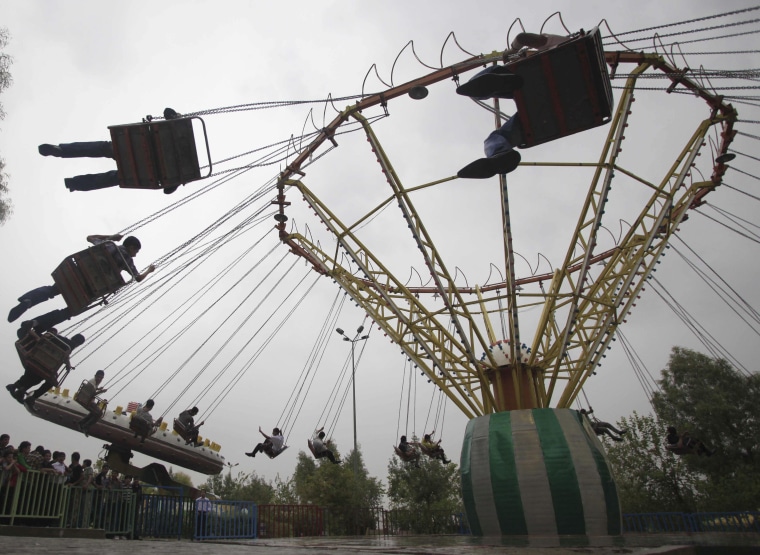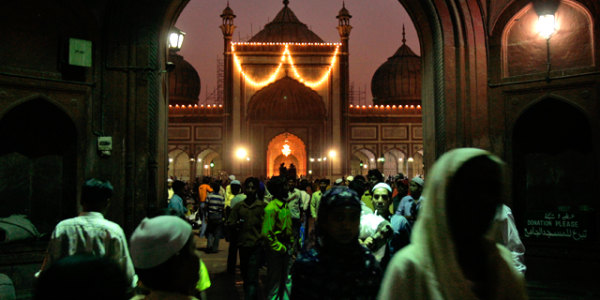Iraqis celebrating the end of the holy fasting month of Ramadan set off in droves Sunday on family trips to the country's northern Kurdish region, a prized escape from the sporadic violence that still batters the capital and other cities.
Such journeys by road — perilous in years past — have greatly increased because of an overall improvement in security around the country, and this year Kurdish authorities in the self-governing region eased entry procedures and ran TV ads to attract visitors from the rest of Iraq.
For the war-weary traveler, the Kurdish region offers not just a refuge from violence but also reliable electricity, stunning natural beauty, cooler weather and fewer social restrictions.
"We have heard from people who have been there ... that it's like being in a different country," said Haidr Mohammed Ali, a 36-year-old government employee from Baghdad who was taking his wife, two children and his cousin's family to the Kurdish city of Irbil by minibus.
In years past, many Iraqis spent the three-day Eid al-Fitr holiday indoors out of fear. Some of those who did venture out were killed by car bombs that tore apart markets and parks. Mosques were emptied of worshippers. Instead of visiting one another, relatives would speak by telephone.
For most Muslims, this year's holiday began Sunday; others will celebrate starting Monday.
Throughout the more than six years of war, Iraqi Kurdistan — which runs its own affairs and is protected by its own militia force known as the peshmerga — has been safer than the rest of the country. It is home to some of the country's most beautiful countryside, attracting even a handful of tourists from the U.S. and Europe to see its waterfalls, mountains and lakes.
Muslims typically celebrate Eid al-Fitr by visiting relatives and packing into parks to mark the end of a month of sunrise-to-sunset fasting. Many also visit family graves.
Feels ‘suffocated’ by Baghdad's violence
In the Kurdish city of Sulaimaniyah, Baghdad resident Tamara Murad was out shopping for brand-name clothes that she cannot find in the capital.
The 24-year-old said she feels "suffocated" by Baghdad's violence and its more conservative social environment. She and a female cousin were dressed in clothing young women would not dare to wear in Baghdad — Murad in jeans and a low-cut T-shirt and her cousin in a short skirt.
"We came here because in Baghdad we do not feel that we are free to wear what we want or walk on the street without the fear of being kidnapped or targeted by explosions," she said.
"We came here to smell the scent of freedom. But the fact that this journey must come to an end and we must head back to Baghdad, where we wither with the bitterness of life, spoils my happiness," she said.
Over the years, many Iraqi artists, doctors, professors and others have moved to the Kurdish north for its safety. An American-style university opened in January 2008 in Sulaimaniyah, 160 miles (260 kilometers) northeast of Baghdad and a world apart from its trouble.
After the 1991 Gulf War, Iraq's Kurdish minority — which suffered terribly under Saddam Hussein's government — came under the protection of U.S.-led air patrols and broke nearly all ties with Baghdad. During the insurgency that followed the March 2003 U.S.-led invasion, Kurdistan remained safer ground.
Slideshow 16 photos
Eid al-Fitr
Kurdistan's Tourism Ministry, which has renovated resorts and advertised on satellite TV, did not have exact figures but said it estimated the number of visitors had doubled compared with last year's Eid.
Markets packed with Iraqi visitors
On Sunday, Iraqi visitors packed markets to buy clothes and holiday sweets.
The owner of one of Sulaimaniyah's best-loved sweet shops was happy to see Arab tourists coming to try a sugary desert known as mann al-samma, or the sweet of heaven. It is made with the fruit of a mountain tree and is found nowhere else.
"My income depends greatly on Arab tourists coming from Baghdad and southern Iraq," said Tawfiq al-Halawji. "I expect a big increase in my income during Eid because more people are coming."
In Baghdad, many Eid celebrants tried hard not to be consumed by the capital's woes. They danced, greeted one another warmly at mosques and visited an amusement park.
And there was one auspicious sign welcomed by all: The night before, the drought-stricken country got a rare heavy rain storm.
"Although I lost two sons in the sectarian strife, I am very optimistic this Eid. I feel that relief is coming to Iraqis," said housewife Umm Mohammed after Eid prayers. "What makes me more optimistic is to see that rain fell on the eve of Eid, the rain which we were deprived of for years."
Elsewhere, Muslims around the world also celebrated the end of Ramadan. Here's a look at how those nations celebrated:
Egypt
Families thronged the streets and the banks of the Nile to celebrate, showing off children in new holiday outfits. On overloaded Nile cruise boats decorated with brightly colored lights, men and women danced to traditional Egyptian music blaring. Children set off fireworks in the streets.
The traffic that normally snarls the busy streets of Cairo eased as many used mass transit to visit amusement parks and Cairo's few gardens. Vendors and beggars wished passers-by a happy Eid with a smile, hoping for a tip.
Supermarkets and sweet shops had special sales on hundreds of boxes of traditional Eid cookies. Another popular Eid treat is smoky or salted fish as most Egyptians refrain from eating those dishes during the fasting month of Ramadan.
In downtown Cairo there was a beefed up police presence to keep the boisterous crowds under control after incidents of mass harassment against women two years earlier.
Saudia Arabia
Saudis decorated their homes and prepared sumptuous meals for friends and family. Big chunks of lamb mixed with rice and vegetables is traditional. The whole country reveled in celebration with men and women greeting and kissing each other in big cities.
All male folk dances with swords were performed in public.
In the capital Riyadh, the local government planned celebrations that began with prayers followed by seven separate fireworks displays, concerts, theater, poetry readings, a parade and women's programs. Car races, a remote control air show, a sky diving performance, a bicycle race and traditional music were also planned.
Palestinian territories
In Gaza City, the old market was packed with street merchants hawking their wares and families shopping for new clothes, sweets and salted fish. But the holiday atmosphere was strained in Gaza, which has been under an Israeli-Egyptian blockade for two years and is still reeling from January's war.
"People are psychologically worn out since the war," said Midhad Ihmeid, 45. "Does someone who lost a family member or had his house wrecked want to go and buy new shoes?"
Salam Haddad, a 34-year-old vendor, said Gaza's economic decline was affecting holiday preparations, and only the network of smuggling tunnels under the Gaza-Egypt border was keeping commerce alive.
"There's no work here now, so people don't have much money for the holiday," he said.
Pakistan
Thousands of people in the capital of Islamabad flocked to the main bazaars to eat, shop and celebrate.
Pakistan's President Asif Ali Zardari reminded people in a statement to remember those during Eid who sacrificed themselves for peace.
"Amidst Eid celebrations this year, let us not forget those members of our armed forces, the police, the law enforcing agencies and civilians who laid down their lives in the fight against militants so that we may truly celebrate this Eid in peace," Zardari said, referring to Pakistan's gains in recent months against a homegrown Taliban insurgency.
Afghanistan
In the capital Kabul, children dressed in their finest clothes for the celebration, as families posed for formal photos against the backdrop of the mountains that surround the Afghan capital.
Despite a recent increase in violence in Kabul, the city was crowded and festive — its markets were full and many of the streets were jammed with cars filled with people on their way to and from holiday meals.
Sudan
The start of the feast is marked by massive outdoor worship services at local mosques. Many then spend the afternoon and evening visiting family, friends and neighbors. Those with recent deaths in the family get special attention in hopes the celebrations will distract them from mourning. In cities, families also head to public gardens for picnics while kids run around with newly purchased toy guns and shoot at each other.
Sudanese President Omar al-Bashir called for the country's numerous armed movements to lay down their arms and engage in dialogue rather than violence to solve their differences.
Yemen
Eid came at a time of great suffering here from the economic crisis, war in the north and instability in the south.
In northern Saada province along the Saudi border, thousands of civilians have fled fighting between Shiite rebels and the government and most children did not receive traditional gifts of money or new clothes. The province's biggest and oldest mosque was empty this year instead of being filled during the dawn prayers as in the past.
Many in big cities stayed home instead of going out to restaurants as they did in past years, though chewers of the stimulant qat leaf still gathered in many neighborhoods to swap stories of the past.

